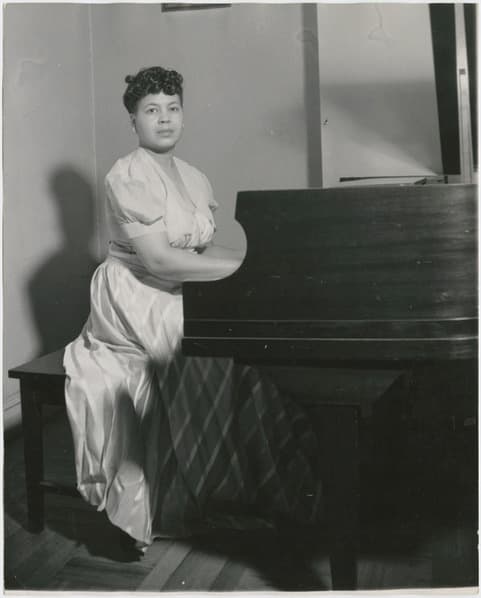Dr. John Michael Cooper is a scholar who specializes in the lives and music of African-American composers. His new book, “Margaret Bonds: The Montgomery Variations and Du Bois Credo”, will be released next month.

John Michael Cooper
In this interview, he shares with us the story of Margaret Bonds‘ life and work and discusses the journey of recovering her legacy.
Would you like to tell us a little bit about the new book?
Margaret Bonds: Decision from Montgomery Variations
Thank you for this question. Aside from Anna Harwell Celenza’s exhibition catalog of the Langston Hughes-related materials from Margaret Bonds papers in the Georgetown University Library, this will be the first book-length study of her life and works. It focuses on her largest surviving orchestral work (The Montgomery Variations) and her largest surviving choral work (the setting of the iconic civil-rights Credo of W.E.B. Du Bois), but the focus on those works is enfolded into a biographical study that situates them in the context of what I term “the Bonds mission” – Margaret Bonds’s career-long quest to use what she termed her God-given talent and her art to serve the divinely mandated causes of racial justice and global equality, especially where these concerned the celebration and valorization of those whom Dr. Martin Luther King, Jr., called “the poor and despised of the twentieth century . . . [who] will fight for human justice, brotherhood, secure peace and abundance for all.”

Margaret Bonds
And these two main threads are viewed through the lens of Margaret Bonds’s art as a means for her to communicate with performers and audiences, to share with them her compelling message. For this reason, the book goes into some detail identifying the specific events, personalities, and writings that prompted specific aspects of these two masterpieces. The whole is based on a sizeable number of never-before-published letters and other documents.
What inspires you to discover/rediscover Margaret Bonds?
That’s easy: she does – her life, her personality, and her music.
arr. MARGARET BONDS: He’s Got The Whole World In His Hands
But please understand that this really isn’t a discovery or rediscovery. In order to be “rediscovered,” something has to have first been “discovered,” and in fact Margaret Bonds’s name, and the few of her compositions that the political economy of classical music did not actively suppress during her lifetime, have never really been forgotten. For example, her setting of He’s Got the Whole World in His Hands, first written for soprano Catherine Van Buren after the death of Bonds’s mother in 1957 and made famous by Van Buren’s student and Bonds’s friend Leontyne Price in 1962, remains the gold standard for that particular spiritual: there are other settings, but everyone always returns to Bonds’s. And her Troubled Water has been a mainstay of the piano repertoire, especially for the community of African-American pianists, since it was published in 1967. So this is more a matter of recovery than either discovery or rediscovery – that term is still a little fuzzy, but it comes closer than either of those other two to giving due credit to those who have acted as Bonds’s stewards over all these years.
Margaret Bonds: Troubled Water
Margaret Bonds – Montgomery Variations (1964)
For me personally, the story goes back to a specific moment of light in 1986 or 1987. I was in Tallahassee, Florida, and attended a recital in a local church. I am sure the entire recital was fine, maybe excellent – but most of the program was the same old same-olds (canonical songs by Schubert, Robert Schumann, Fauré) and I have, embarrassingly enough, forgotten it over all these years. But the program included two moments that I will never forget: Florence Price’s Songs to the Dark Virgin and (to the point of your question) Margaret Bonds’s Three Dream Portraits. Those four works stunned me, flabbergasted me: although I was a graduate student in musicology and had an extensive career of performing and (even more) listening, I had never before heard those pieces or even been introduced to their composers’ names – and they were utterly unlike anything else I knew, possessed of poetry, originality, a vision that I found staggering. Immediately afterwards I went to try to find more music by Bonds and Price, but even though what I could read about them (with the resources that were available in print in the late ‘80s) made clear that both were prolific composers and the music I had just heard made clear that Bonds’s and Price’s voices were ones that demanded and deserved to be taken seriously and widely heard and studied, I could lay hands on only a very few pieces by either composer. It aggravated me more than I can express here – and so at that point, I set out on a personal and private quest to try to find more music by both Price and Bonds. I was at a disadvantage, I understood dimly even then because as a White male, I had been taught to think about, understand, and teach just about everything except music by Black women: the learning curve was daunting. But over the years I took notes on editions, manuscripts, and recordings, read a lot, and ruminated a lot – and by ca. 2018 I was ready to try to address that question that had lain there, unanswered and burning, all those years. I had to try to contribute to the righting of the great injustice of the suppression of Bonds’s and Price’s musical voices by the forces of systemic racism and systemic sexism and the political economy of music publishing. When I finally made my first archival exploration, I was even more dazzled by what I found in their hundreds of unpublished works than I had expected. And so I started engraving it, sought publishers, and tried to get some of those pieces out there.
Margaret Bonds: 3 Dream Portraits
That fateful recital in Tallahassee in 1986 or 1987 was my personal moment of light – and even now the remembered power and beauty of that first encounter with the music of Margaret Bonds give me chills. Thirty-six years have passed – so much water under the proverbial bridge. But more than anything I wish I could find the singer and pianist (both African American women) who changed my life with their programming and their artistry. (If they’re reading this, I hope they’ll reach out to me so I can thank them.)
Florence Price’s Song to the Dark Virgin | Mark Rucker, Baritone; Sadie Rucker, Piano
What are the challenges during the recovery process?
Oh, yes. Aside from the vexing problem (mentioned above) of my positionality as a White male trained at every turn to understand everything except the things that have to be understood here, there was the problem of many thousands of pages not only of complex musical scores and multiple competing versions of certain individual works, but also the enormous corpus of long and very intense letters that Bonds wrote, and comparably huge body of the letters that she received and kept, and the likewise huge body of programs and other documents that also document her life and work. More specifically, the task of editing The Montgomery Variations and Credo is enormous and complicated: all three of the principal surviving autographs are complex and contain “traps” that could lead editors, performers, other interpreters, and audiences into actually seeing and hearing what Bonds did not write rather than what she did, what she rejected rather than kept. And finally, because the available sources concerning her work and these works in particular have been based on such an unfortunate paucity of sources, a number of “urban legends” have grown up around these masterpieces over the years. Setting those plausible (but ultimately false and misleading) conventional wisdoms aside and viewing what Bonds wrote afresh, and then telling that factually solid truth and exploring some of its ramifications was a great challenge.
During the research process, did you discover something that surprised you? Would you like to share?
Margaret Bonds: CREDO, performed by the UMKC Conservatory Choirs & Orchestra, cond. Jennaya Robison
Many things. For example, I was surprised to see how cogent and logical the steady progression of social-justice-related compositions leading up to The Montgomery Variations and Credo was – one is tempted (but not too much) to think that she consciously set out on the path toward that future as soon as she graduated from Northwestern University with her Master’s degree in 1934. (She did set out on the path, and quite consciously, at that point, but as a twenty-one-year-old she had no idea what the events of the Civil Rights movement of the late 1950s and early 1960s would be – so that tempting supposition doesn’t quite hold up.) I was surprised that she, born and raised in a Baptist tradition that relied profoundly on women but in most churches refused even to let women stand at the pulpit, consistently referred to God as feminine-masculine (for example, in the program to The Montgomery Variations: “A benign God, Father and Mother to all people”). I was surprised to learn that the familiar narrative that Bonds never heard The Montgomery Variations or the orchestral version of the Credo, with the suggestion that the first performance of the Credo (in excerpt) occurring only shortly after her death is untrue: the late Dr. Albert McNeil, a great choral conductor, founder of the Albert McNeil Jubilee Singers, and a frequent collaborator of Bonds, conducted both compositions at a concert in San Francisco in 1967, and she was present for that event. It’s easy to understand why people love to tell the story of her choral magnum opus receiving its first performance only weeks after her death, and this through the superb Los Angeles Philharmonic under the direction of Zubin Mehta – that’s a great story. But it’s not true, and the story that is true teaches us how Margaret Bonds worked assiduously, and with the support of the community of Black folk, not non-Black, to push back against the systemic silencing that she faced every day of her life because of her race and her sex.
What is your next project?
Margaret BONDS, Two Movements from Spirituals Suite, performed by Anton Nel
I’ve just completed the first book-length biography of Margaret Bonds, and which is currently at press with Oxford University Press, slated to appear in late 2024 or early 2025. And I have a very large raft of new editions of otherwise unknown compositions by Bonds slated to be released as part of Hildegard Publishing Company’s Margaret Bonds Signature Series. It’s all quite exciting, and while I have to admit that as an old fellow, I have more yesterdays than tomorrows in which to do my part of the serious work that’s out there to be done, I also know this: I won’t quit until I have to. The rewards of learning the long-suppressed beauty and power of Margaret Bonds’s music are just too great. I hope others will accept the challenge of mainstreaming her work and her extraordinary life.
To know more about the book here.
For more of the best in classical music, sign up for our E-Newsletter



